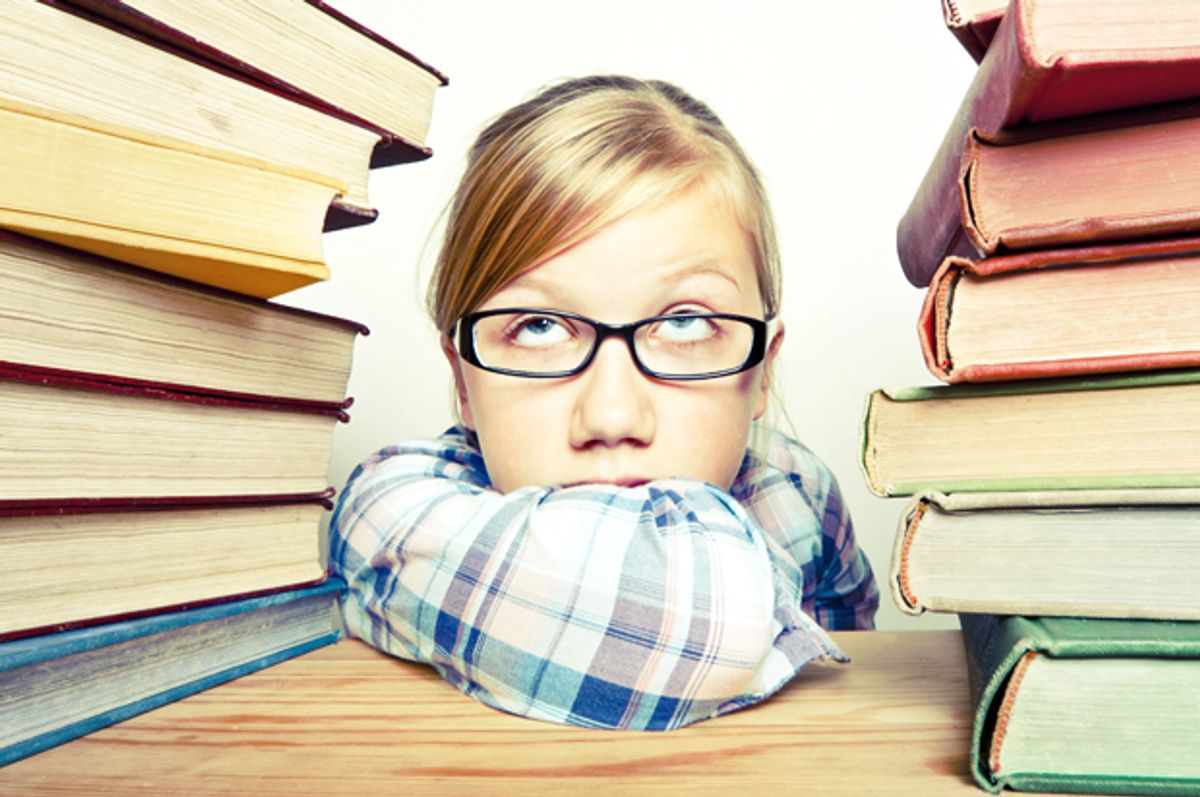Recently, while cooling my heels at the airport, I overheard a boy of about 6 begging his mom to let him play with the family iPad. "No screen time until you do an hour of reading first," was her reply. The child flung himself back in his seat and opened a paperback book with a disgruntled sigh.
I winced. Of course parents need to supervise their kids' use of digital devices and the Internet. God only knows, plenty of adults have a hard enough time managing their own screen time, including people with a fundamental investment in literary culture, like novelists Zadie Smith (who uses the Internet-blocking software Freedom) and Jonathan Franzen (who has disabled the Ethernet portal on his writing computer). The American Academy of Pediatrics recommends no exposure at all to television, computers and cellphones for children under the age of 2 and suggests that older children's "total entertainment screen time" be limited to one or two hours per day.
Most parents are also acutely aware of the importance of good reading skills to their children's academic future. If they're particularly well-informed, they're aware that a recent report from Common Sense Media indicates the number of children aged 8 to 17 reading for pleasure has dropped significantly in the past few years. Digital media is frequently blamed for distracting kids from books, and so perhaps it's not surprising that some parents have gotten the idea of using screen time as an incentive for page time.
The site Reading-rewards.com, for example, was set up by parents who decided to "put a system in place whereby their kids had to earn TV or game console time by reading: 1 minute TV time for every minute of reading." Recently, FreeTime, a user-profile control app on the Kindle Fire, introduced a new setting by which parents can require their kids to spend a certain amount of time reading e-books before they can access the device's games. In essence, these are digital versions of a clever "game token" allowance system created by a contributor to the Instructables website; her kids earn handmade chips good for computer time by doing chores around the house.
But there's the rub: Reading should not be a chore. Chores are tasks that nobody wants to do but that have to be done all the same. Life is full of such activities. Part of being an adult is learning to suck it up and take care of them, yet another thing parents have to teach their kids. Kids often have to be bribed to do this with an allowance or game tokens or some other treat because kids aren't big on the long view. They don't care that if they don't wash the dishes tonight; there will be no clean ones to eat off of tomorrow because tomorrow seems so irrelevantly far away.
To make an hour spent with a book into the equivalent of loading the dishwasher is to send the strong, implicit message that reading is a similar task, one that will never be a source of pleasure. You may end up with kids who have logged in lots of hours of reading, but that won't make readers out of them. There's a vast difference between dutiful, grudging, joyless reading and the kind of hungry, engaged reading that makes for a good student and a thoughtful citizen. It's hard to be good at something you don't enjoy.
The FreeTime read-for-play control makes this bad idea even worse by shucking the enforcement of it off onto a mindless bot. It reinforces the idea that reading is the intellectual equivalent of the spinach you have to eat in order to get dessert, and it suggests that the whole transaction is so tedious your parents can't even be bothered to enforce it in person. Is it any wonder, then, that reading rates drop precipitously once kids enter their teens and begin to scrutinize the double standards of the adults in their lives?
There's abundant research indicating that the primary way children learn to love reading is by growing up with adults who frequently choose to read for pleasure. Having plenty of books around the house is another contributing factor. Just as important, though less discussed, is making an effort to help kids find books that appeal to them. Even parents who like to read can be discouraged when their own childhood favorites don't win over their offspring. However, children are just like adults; each one is an individual with his or her own particular taste, and helping them find the books that speak to those tastes is the major part of improving their reading skills.
There are some digital tools that might help with this, such as Wandoo Planet's "interest tree" generator, designed to coax out a child's preferences and provide some tailored recommendations. Book subscription services, like Epic, the kids' equivalent of Oyster and Scribd, can provide a broad selection of e-books to browse through. But the best guide will almost always be an observant and helpful adult: a teacher, a librarian, a children's bookseller -- in other words, the kind of person who has devoted her whole life to helping children fall in love with books and who appreciates just how personalized the process should be. (That's who did it for me -- thanks again, Mrs. Belden!) The way to get kids to invest their time in reading is to be willing to invest some time and energy in it ourselves.
Further reading
The American Academy of Pediatrics' report, "Children, Adolescents and the Media"
Common Sense Media's report, "Children, Teens and Reading"
Instructables on creating a "game token" alternative to allowance

Shares